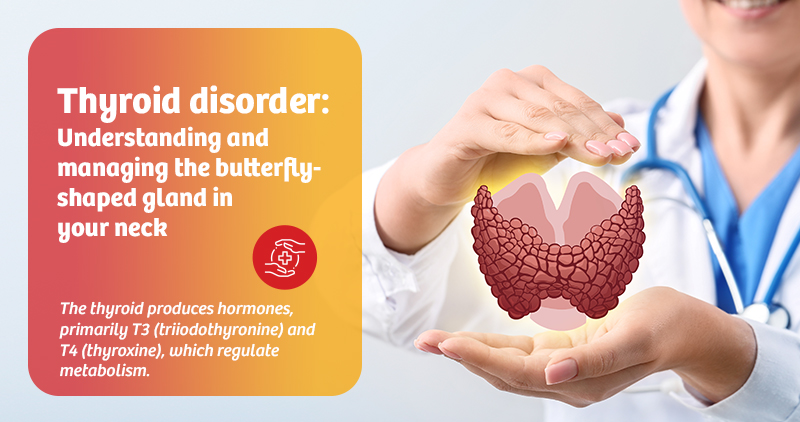

By Dr Akash N Shah
Consultant Endocrinologist
Feb 04, 2025
The thyroid gland, a small, butterfly-shaped organ in your neck, plays a massive role in regulating your metabolism, energy levels, and much more. While small, it has a powerful impact on your overall health. When the thyroid is not functioning correctly—underactive (hypothyroidism) or overactive (hyperthyroidism)—it can disrupt your body's balance. Let's explore the symptoms, causes, and what you can do to manage thyroid disease.
The thyroid produces hormones, primarily T3 (triiodothyronine) and T4 (thyroxine), which regulate metabolism. These hormones control how your body uses energy, influence heart rate, and even impact brain function. Think of the thyroid as your body's thermostat, regulating the pace at which everything works.
When things go wrong: Hypothyroidism vs. Hyperthyroidism
Hypothyroidism is the most common thyroid disorder. It occurs when the thyroid doesn't produce enough hormones, causing bodily functions to slow down.
Diagnosis & treatment: The standard for diagnosing hypothyroidism is a blood test measuring TSH (thyroid-stimulating hormone) and T4 levels. Treatment typically involves taking levothyroxine, a synthetic hormone that restores balance.
Hyperthyroidism occurs when the thyroid produces too much hormone, causing your metabolism to accelerate.
Common symptoms:
Diagnosis & treatment: Hyperthyroidism is diagnosed using blood tests similar to those for hypothyroidism, as well as imaging tests like a thyroid scan. Treatment options include:
While thyroid conditions can affect anyone, certain groups are at higher risk:
If you have thyroid disease, there are several ways you can manage your health and feel your best:
Regular check-ups:
Routine blood tests can monitor thyroid function, especially for those at higher risk or on thyroid medication.
Nutrition
Exercise
Exercise supports overall health and can help manage symptoms, such as fatigue in hypothyroidism or anxiety in hyperthyroidism.
Manage stress
Stress can aggravate thyroid conditions. Meditation, yoga, or breathing exercises can help control stress levels.
Can thyroid disease be cured?
How often should I get my thyroid checked?
Is thyroid cancer common?
Thyroid cancer accounts for about 1–2% of all cancers. While its incidence has risen in recent years due to better diagnostic techniques, the prognosis is generally excellent, especially for papillary thyroid cancer, the most common type. Early detection and treatment lead to a 5-year survival rate of over 98%.
Risk factors include:
Early detection through neck exams and ultrasounds can significantly improve outcomes.
Best endocrinology hospital in Ahmedabad.
Understanding thyroid disease is the first step toward taking control of your health. By recognising symptoms, managing risk factors, and working with your healthcare professional, you can live a complete and balanced life. KD Hospital has a dedicated department that deals with all endocrine problems, with state-of-the-art facilities and experienced experts under one roof.